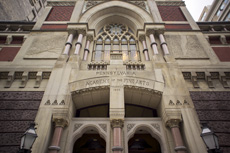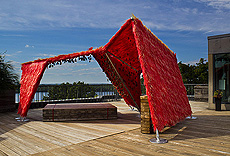Jennifer Reeser
The LaLaurie Horror
Canto IV
Beginning its fast, topaz-clad patrol,
Dusk had arrived in full. I turned to face
An entity with hair the hue of coal,
With eyes the shape of nutmeg shells, ground mace
In shade, the clear complexion; thin right thumb
Pressed to its mouth--less than a breathing space
Away from mine, the tint of tainted plum.
Beneath a scrutinizing, graceless gaze,
I felt Marie Delphine herself had come.
The tatters of her dress blurred, phase by phase,
Against the Vieux Carré's transcendent blues,
The humid wind's relayed, melodic phrase.
Of course. Of course! The cat--cat come to use
The canary! And, of course, I would comply.
Commanding as she was, could I refuse?
The secrecy of what it is to die
She knew, she had accomplished, and for that
Deserved the full respect of my reply--
Despite her likeness to the cunning cat--
Even if she craved cruelty, ate waste,
Spat malice, and believed the earth were flat.
She clasped illegal currency, defaced
Nearly to the degree of pestle dust.
Her digging nails drew plasma thick as paste,
Beneath their tips, a fungus like white rust,
And wrinkle-free, the knuckles of each fist.
She smirked at me, and murmured, "You, I trust."
"Correction must resolve the world," she hissed.
"Possession is a poet robbed of voice.
Stay, and recite some sonnet. I insist.
Intently, sugar, look around, rejoice
At this proficient ignorance, in tune
With torture--and be glad you are my choice.
Reprieve is pointless, time is picayune,
And chronic. I will not leave you alone.
Forgiveness kills. Forever comes too soon."
The spores of salmon pink mimosa, blown
In fragile capsules, drifted with persistence
Through terrace mosses, mingling with the drone
Of some musician muted in the distance--
A trumpet sound which Gabriel's final blast
Would one day silence into non-existence--
Comparable to this apparition's cast,
Similar to this fierce, translucent form
Determined to perform the distant past.
With cool detachment tempered by the warm
Involvement of concern, our tour guide--tanned,
Obviously at ease beyond the norm--
Straightened himself and waved one hairy hand
At fat mosquitoes, then resumed his lecture:
"The building, as originally planned,
Had only two floors, not this architecture
You see here: less commanding and aloof,
But which remains a subject for conjecture.
There is no printed, documented proof
It even stood at all, though we presume
It stood beneath a hipped and dormered roof;
A stable, carriage house, and laundry room
Beyond the central hall and court enclosure,
With quarters for the slaves--cook, laundress, groom;
A garden to the outermost exposure."
With superhuman effort, I became
The model of suppressed, debarred composure.
"Before we cross the street, let me disclaim
Any responsibility," he laughed,
"No accident, I haven't told my name."
At that, the mansion walls burst into flame.
City in Bleak
(New Orleans, autumn)
Poor palm in the steam of a water treatment tower,
and a woman waves a white cloth twelve floors up;
plump rock doves on the corner of Decatur
and Conti gobble crumbs hurled from a cup.
The Faulkner Bookstore dealer--sweater-vested
and spectacled--is happy Chekov sells,
inscribes our thin receipt by hand, reclines
against the tatting of his chair and tells
us to avoid the tank outside, to east,
sweeping through Pirate's Alley. I hear gulls,
trains, crows--the Tao of common life at least.
I search the galleries and Quarter racks
for subtle postcards, postcards I could send
to anyone without embarrassment,
whose artistry defies both rite and trend.
I find Monsieur Clauzade, arrived from France,
whose bijou girls and beach scenes seem to tear
the walls with their primary colors, and Sebille
with shocking poppies, scarlet as a flare,
on scads of yellow paint.
The convent halls
alone are left to find, though I foresee
postcards will be collected slowly, streetcars
be tardy, and time not enough for me.
Versailles Ballade
The morning beams steal down the field of Mars.
The streets, awash in soap suds, smell of sage.
The people march to work, a few in cars,
and some on cycles pedal to their wage.
I pull the coverlet, roll my ribcage
towards one corner of the mattress, lie
composed as any corpse, and disengage.
I have made love in Paris. Let me die.
Aurora, Mars beside, pours out her jars,
with gravity his gun, and time his swage,
illuminating brasseries and bars,
the rooftops of Grand Garnier's opera stage.
Fed on tartelettes of the Chartreuse gage,
I have seen queens' swans, moved a man to cry,
heard Bach played in the Metro on guitars.
I have made love in Paris. Let me die.
Though this same sunlight reaches me, and wars
against my body, forcing it to age,
outlining its deficiencies, its scars
become italic, as upon a page,
I shall not let its insolence enrage,
but blankly only wonder with a sigh.
There is no longing left here to assuage.
I have made love in Paris. Let me die.
Revered and royal phantoms--shahs, kings, czars
forever overshadowing Versailles
through mirrored hallways: hear me from the stars!
I have made love in Paris. Let me die.
Marie Antoinette's Magnolia Tree
(in le hameau de la Reine château de Versailles, 2012)
Walking through the hamlet of the queen,
past cherry blossoms, lilacs, weeping willows,
wood benches set at angles, silver-green,
white daisies, blue flax, dandelion yellows,
I stopped, stunned by a lone magnolia tree--
its glossy leaves diseased and turning brown.
You would not have approved of it, Marie,
these singular disgraces in the crown.
Your garden of red rhubarb in a blur
of elevated vigor left behind,
you might have sought your squatting gardener,
and issued him a measure of your mind:
valet de pied of rebels, to allow
a foreigner this way, so southern-brow.
|
|
 |
 |
| AUTHOR BIO |
 Jennifer Reeser is the author of An Alabaster Flask, winner of the Word Press First Book Prize, Winterproof, and Sonnets from the Dark Lady and Other Poems, a finalist for the Donald Justice Prize. Her poems, critical essays, and translations of French and Russian literature have appeared in journals including Poetry, The Hudson Review, The Formalist, Light Quarterly, Able Muse, The National Review and The Dark Horse, and have been gathered in anthologies such as Longman's textbook, An Introduction to Poetry (edited by X.J. Kennedy and Dana Gioia), and Poets Translate Poets: A Hudson Review Anthology. She is a mentor on faculty with the West Chester Poetry Conference, and lives amid the bayous of southern Louisiana with her husband, the fiction writer, Jason Reeser, and their children. Her website may be found at: www.jenniferreeser.com. Earlier work in Mezzo Cammin: 2011.2, 2011.1, 2008.2, & 2006.2. Jennifer Reeser is the author of An Alabaster Flask, winner of the Word Press First Book Prize, Winterproof, and Sonnets from the Dark Lady and Other Poems, a finalist for the Donald Justice Prize. Her poems, critical essays, and translations of French and Russian literature have appeared in journals including Poetry, The Hudson Review, The Formalist, Light Quarterly, Able Muse, The National Review and The Dark Horse, and have been gathered in anthologies such as Longman's textbook, An Introduction to Poetry (edited by X.J. Kennedy and Dana Gioia), and Poets Translate Poets: A Hudson Review Anthology. She is a mentor on faculty with the West Chester Poetry Conference, and lives amid the bayous of southern Louisiana with her husband, the fiction writer, Jason Reeser, and their children. Her website may be found at: www.jenniferreeser.com. Earlier work in Mezzo Cammin: 2011.2, 2011.1, 2008.2, & 2006.2. |
|
| POETRY CONTRIBUTORS |
 Diann Blakely Diann Blakely
 Terese Coe Terese Coe
 Enda Coyle-Greene Enda Coyle-Greene
 Erica Dawson (Featured Poet) Erica Dawson (Featured Poet)
 Nicole Caruso Garcia Nicole Caruso Garcia
 Terry Godbey Terry Godbey
 Tracey Gratch Tracey Gratch
 Athena Kildegaard Athena Kildegaard
 Diane Lockward Diane Lockward
 Mary McLean Mary McLean
 Mary Meriam Mary Meriam
 Jennifer Reeser Jennifer Reeser
 Susan Spear Susan Spear
 Myrna Stone Myrna Stone
 Doris Watts Doris Watts
 Gail White Gail White
 Marly Youmans Marly Youmans
|
|
|
 |
|
 |
Mezzo Cammin is proud to announce the third anniversary of The Mezzo Cammin Women Poets Timeline Project, which will be celebrated on Thursday, March 21, from 6:00-9:00 at the Pennsylvania Academy of the Fine Arts, as part of its PAFA After Dark series and in affiliation with its exhibition The Female Gaze. Featured readers will include Rachel Hadas, Marilyn Nelson, and Sonia Sanchez. Also performing will be singer Suzzette Ortiz and poets from the Philadelphia Youth Movement. The event is open to the public.
|
|
|
|
 |
|
|
|
 |
| Jean Shin: Much of my work is site-specific, establishing a dialogue with not only architecture and outdoor spaces, but also the communities that inhabit and activate them. By reinserting used, familiar materials back into the public realm, I invite a large, diverse audience to bring their own histories to the work. Through these encounters each installation forms its own imagined community, revealing new associations and meanings for ephemera, and speaking to our shared experiences.
|
|
|
|
|
|
 |
|
 |
|
|
|
|
